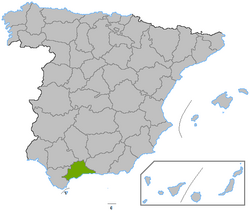Province of Málaga

The Province of Málaga (Spanish Provincia de Málaga) is located on the southern coast of Spain, in the Autonomous Community of Andalusia. It is bordered by the Mediterranean Sea to the South, and by the provinces of Cádiz, Sevilla, Córdoba and Granada.
Its area is 7,308 km². Its population is 1,330,010 (2002), of whom two-fifths live in the capital Málaga, and its population density is 181.99/km².
Its main industry and claim to fame is its tourist resorts, particularly those on the beaches along the Costa del Sol ("Sun Coast"). These beaches are visited by millions of European tourists. But besides the beaches, the mountainous province has some very interesting places to visit, like the gorge of El Chorro or the Torcal in Antequera.
The magnum opus of Cuban composer Ernesto Lecuona, "Malagueña", is named for the music of the Gypsies of this region of Spain. Another famous patron of the city is Pablo Picasso.
Málaga contains 100 municipalities. Besides the capital, its main cities are Marbella, Vélez-Málaga, Antequera and Ronda.
The population is concentrated mainly in the metropolitan area of Málaga and throughout the coastal area. The population density surpasses both the Andalusia and Spanish averages, reaching 204.06 hab/km². The municipalities of Antequera and Ronda , both with more than 35,000 inhabitants, are located in the interior.
The prevailing climate is a warm Mediterranean with dry and warm long summers with short mild winters. The geographical relief varies greatly from zone to zone. In general, the Eastern coastal zone has a subtropical Mediterranean climate. While in the Eastern end, the influence of the Atlantic ocean gives more rains that are quite abundant. To the north, a Continental Mediterranean climate exists with cold, dry winters and warm summers.
- Regions:
- La Axarquía
- Valle del Guadalhorce
- Serranía de Ronda
- Comarca de Antequera
- Costa del Sol Occidental
- Vega de Málaga
See List of municipalities in Málaga.
External links
- Alcornocales Natural Park (Spanish)
- Sierra de las Nieves Natural Park (Spanish)
- Montes de Málaga Natural Park (Spanish)
- Sierras de Tejeda, Almijara y Alhama Natural Park (Spanish)
- Grazalema Natural Park (Spanish)
|
|||||||||
|
|||||||
|
|||||